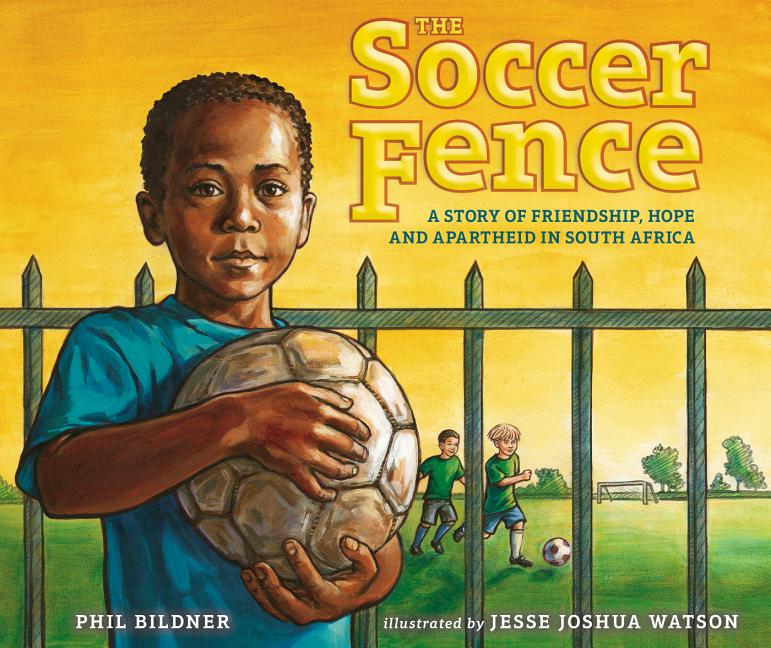Book Descriptions
for The Soccer Fence by Phil Bildner and Jesse Joshua Watson
From Cooperative Children's Book Center (CCBC)
In the days before the end of Apartheid, a young Black South African boy who loves soccer plays in his dusty township, but can only watch the game played by white boys in the neighborhood where his mother works. Then Nelson Mandela is freed — progress! But it proves to be slow from the young boy’s perspective — he’s still ignored by the white boys playing soccer. Mandela is elected president a few years later. The white boys still ignore the boy. Then South Africa hosts the 1996 African Cup of Nations soccer tournament, and both the Black boy and one of the white boys he’s seen playing soccer end up at the final. “Standing on my seat, I spotted the blond boy standing on his seat in the next section. He saw me and raised his fist. I raised my fist back.” In the joyful celebration that follows South Africa’s victory, the two boys lead a parade through their section of the stands. An author’s note provides more information on the symbolic importance of the South African victory, which united Black and white South Africans as they cheered for their national team. A story built around this symbolism remains centered on a child’s longing to play. (Ages 7–10)
CCBC Choices 2015. © Cooperative Children's Book Center, Univ. of Wisconsin - Madison, 2015. Used with permission.
From the Publisher
In a country struggling with acceptance, hope can come in many different forms.
As a boy, Hector loved playing soccer in his small Johannesburg township. He dreamed of playing on a real pitch with the boys from another part of the city, but apartheid made that impossible. Then, in 1990, Nelson Mandela was released from prison, and apartheid began to crumble. The march toward freedom in South Africa was a slow one, but when the beloved Bafana Bafana national soccer team won the African Cup of Nations, Hector realized that dreams once impossible could now come true.
This poignant story of friendship artfully depicts a brief but critical moment in South Africa’s history and the unique role that sports can play in bringing people together.
As a boy, Hector loved playing soccer in his small Johannesburg township. He dreamed of playing on a real pitch with the boys from another part of the city, but apartheid made that impossible. Then, in 1990, Nelson Mandela was released from prison, and apartheid began to crumble. The march toward freedom in South Africa was a slow one, but when the beloved Bafana Bafana national soccer team won the African Cup of Nations, Hector realized that dreams once impossible could now come true.
This poignant story of friendship artfully depicts a brief but critical moment in South Africa’s history and the unique role that sports can play in bringing people together.
Publisher description retrieved from Google Books.


